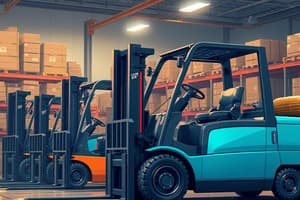Podcast
Questions and Answers
What is the most common type of lift truck accident?
What is the most common type of lift truck accident?
- Truck Tipped Over (correct)
- Forklift Collision
- Load Drop
- Pedestrian Accident
If you have been trained to operate a sit down four-wheel lift truck, you are also qualified to operate a stand-up reach truck.
If you have been trained to operate a sit down four-wheel lift truck, you are also qualified to operate a stand-up reach truck.
False (B)
When is completion of the pre-operation inspection checklist necessary?
When is completion of the pre-operation inspection checklist necessary?
Daily, at the beginning of every shift.
Only trained and authorized operators are allowed to operate a forklift.
Only trained and authorized operators are allowed to operate a forklift.
Is it OK to operate a lift truck that does not have a data plate or the data plate is damaged or unreadable?
Is it OK to operate a lift truck that does not have a data plate or the data plate is damaged or unreadable?
When traveling with a load on a level surface, how high should you raise the forks from the floor?
When traveling with a load on a level surface, how high should you raise the forks from the floor?
Loads should always be carried with the mast tilted to the forward-most position.
Loads should always be carried with the mast tilted to the forward-most position.
When is it OK to give someone a ride on the forklift?
When is it OK to give someone a ride on the forklift?
What does the rear-end steering of a forklift cause?
What does the rear-end steering of a forklift cause?
When depositing a load, lower the forks until there is slack in the chains before backing out.
When depositing a load, lower the forks until there is slack in the chains before backing out.
Why is lift truck operator safety training most important?
Why is lift truck operator safety training most important?
All lift trucks have the same controls and gauges.
All lift trucks have the same controls and gauges.
Is a fork truck considered in good working operating condition even if some of the gauges are broken?
Is a fork truck considered in good working operating condition even if some of the gauges are broken?
What should a person charging or replacing the battery of an electric lift truck always wear?
What should a person charging or replacing the battery of an electric lift truck always wear?
If you know how to drive a car, you also know how to drive a lift truck.
If you know how to drive a car, you also know how to drive a lift truck.
What should be done to a lift truck that is found to be in need of repair, defective, or in any way unsafe to operate?
What should be done to a lift truck that is found to be in need of repair, defective, or in any way unsafe to operate?
What should the operator do before driving a lift truck into a trailer?
What should the operator do before driving a lift truck into a trailer?
When traveling up or down a grade or ramp, the load should always point uphill.
When traveling up or down a grade or ramp, the load should always point uphill.
Who is responsible for preventing accidents in the workplace?
Who is responsible for preventing accidents in the workplace?
What items will take your lift truck out of service?
What items will take your lift truck out of service?
What should you do if a load appears to be improperly stacked or unstable?
What should you do if a load appears to be improperly stacked or unstable?
Is it OK to do a quick battery charge during a lunch break on an electric lift truck?
Is it OK to do a quick battery charge during a lunch break on an electric lift truck?
When refueling a gas or diesel lift truck, what should you never do?
When refueling a gas or diesel lift truck, what should you never do?
Pedestrians should always yield right of way to lift trucks.
Pedestrians should always yield right of way to lift trucks.
If a lift truck begins to tip over sideways, what should the operator do?
If a lift truck begins to tip over sideways, what should the operator do?
Flashcards
Truck Tip-Over
Truck Tip-Over
The most common type of forklift accident.
Forklift Qualification
Forklift Qualification
Training on one type of forklift (e.g., sit-down) does NOT qualify you to operate another type (e.g., stand-up reach truck).
Pre-Operation Inspection
Pre-Operation Inspection
A mandatory inspection that must be completed at the START of EVERY shift.
Operator Authorization
Operator Authorization
Signup and view all the flashcards
Data Plate Requirement
Data Plate Requirement
Signup and view all the flashcards
Fork Height
Fork Height
Signup and view all the flashcards
Load Positioning
Load Positioning
Signup and view all the flashcards
Riding on Forklift
Riding on Forklift
Signup and view all the flashcards
Rear-End Steering
Rear-End Steering
Signup and view all the flashcards
Load Deposit Procedure
Load Deposit Procedure
Signup and view all the flashcards
Driving Skills
Driving Skills
Signup and view all the flashcards
Repair Protocol
Repair Protocol
Signup and view all the flashcards
Trailer Safety Checks
Trailer Safety Checks
Signup and view all the flashcards
Load Orientation on Grades
Load Orientation on Grades
Signup and view all the flashcards
Accident Prevention Responsibility
Accident Prevention Responsibility
Signup and view all the flashcards
Load Stability
Load Stability
Signup and view all the flashcards
Refueling Safety
Refueling Safety
Signup and view all the flashcards
Pedestrian Rights
Pedestrian Rights
Signup and view all the flashcards
Tip Over Procedure
Tip Over Procedure
Signup and view all the flashcards
Study Notes
Forklift Certification Key Points
- Truck Tipped Over: Most common type of lift truck accident.
- Qualification Misconception: Trained on sit-down four-wheel trucks does not qualify for stand-up reach trucks.
- Pre-Operation Inspection: Mandatory completion at the beginning of every shift.
- Operator Authorization: Only trained and authorized individuals are allowed to operate forklifts.
- Data Plate Requirement: Operating a lift truck with a damaged or unreadable data plate is prohibited.
- Fork Height: When traveling with loads, forks should be raised approximately 4-6 inches from the floor.
- Load Positioning: Loads should never be carried with the mast tilted forward.
- Riding on Forklift: Never permissible to give someone a ride on a forklift.
- Rear-End Steering: Causes the rear end to swing outward during turns.
- Load Deposit Procedure: Lower forks until slack is present in chains before backing out, contrary to common belief.
- Safety Training: Crucial to help prevent accidents in the workplace.
- Control Variability: Not all lift trucks have the same controls and gauges.
- Operation Condition: A fork truck with broken gauges is not considered in good working condition.
- Personal Protective Equipment: Essential items when charging or replacing electric lift truck batteries include protective gloves, eye/face protection, and battery acid-resistant aprons.
- Driving Skills: Driving a car does not imply knowledge of driving a lift truck.
- Repair Protocol: Inform supervisor immediately and remove any unsafe lift truck from service.
- Trailer Safety Checks: Ensure trailer can handle lift truck weight, tire blocks are secure, and dock levelers or plates are inspected before entering a trailer.
- Load Orientation on Grades: When traveling up or down ramps, the load should always face uphill.
- Accident Prevention Responsibility: Accident prevention is everyone's responsibility in the workplace.
- Defective Equipment: Leaking hoses, faulty brakes, steering issues, and malfunctioning parking brakes render a lift truck inoperable.
- Load Stability: Straighten loads that are improperly stacked or appear unstable before moving.
- Battery Charging: Quick battery charges during breaks can damage the battery; full charging is necessary.
- Refueling Safety: When refueling gas or diesel lift trucks, never leave the engine running or fill tanks to overflow.
- Pedestrian Rights: Pedestrians do not yield right of way to lift trucks; trucks have priority.
- Tip Over Procedure: If a lift truck tips over, the operator should stay in the truck and ride out the incident for safety.
Studying That Suits You
Use AI to generate personalized quizzes and flashcards to suit your learning preferences.




